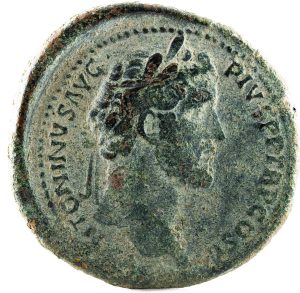I’ve been dropping Marcus Aurelius’s name a bit lately. Marcus was a Roman Emperor who ruled from 161 to 180 AD. He faced numerous trials during his reign, including wars, a plague, political disputes, and personal hardships. Marcus engaged in regular self-reflection, as evidenced by his “Meditations,” in which he explored his own thoughts, actions, and shortcomings. His writings reveal his efforts to find strength and composure in the midst of adversity.
I love nothing more than the way Marcus talks about Antoninus Pius, his adopted father, his heir and successor. Antoninus reigned as Roman Emperor from 138 AD until his death in 161 AD. He’s known for his peaceful and stable rule, as well as his emphasis on maintaining the well-being of the Roman Empire. He was a highly respected and is often considered one of the “Five Good Emperors”, a term coined to describe a period of stability and prosperity in the early second century AD.

Imagine how good of a human you would be to have your son talk about you like this:
“Compassion. Unwavering adherence to decisions, once he’d reached them. Indifference to superficial honors. Hard work. Persistence.
Listening to anyone who could contribute to the public good.
His dogged determination to treat people as they deserved.
A sense of when to push and when to back off.
His altruism. Not expecting his friends to keep him entertained at dinner or to travel with him (unless they wanted to). And anyone who had to stay behind to take care of something always found him the same when he returned.
His searching questions at meetings. A kind of single-mindedness, almost, never content with first impressions, or breaking off the discussion prematurely.
His consistency to friends—never getting fed up with them, or playing favorites.
Self-reliance, always. And cheerfulness.
And his advance planning (well in advance) and his discreet attention to even minor things.
His restrictions on acclamations—and all attempts to flatter him.
His constant devotion to the empire’s needs. His stewardship of the treasury. His willingness to take responsibility—and blame—for both.
His attitude to the gods: no superstitiousness. And his attitude to men: no demagoguery, no currying favor, no pandering. Always sober, always steady, and never vulgar or a prey to fads.
The way he handled the material comforts that fortune had supplied him in such abundance—without arrogance and without apology. If they were there, he took advantage of them. If not, he didn’t miss them.
No one ever called him glib, or shameless, or pedantic. They saw him for what he was: a man tested by life, accomplished, unswayed by flattery, qualified to govern both himself and them.
His ability to feel at ease with people — and put them at their ease, without being pushy.
His willingness to take adequate care of himself. Not a hypochondriac or obsessed with his appearance, but not ignoring things either. With the result that he hardly ever needed medical attention, or drugs or any sort of salve or ointment.
This, in particular: his willingness to yield the floor to experts—in oratory, law, psychology, whatever—and to support them energetically, so that each of them could fulfill his potential.
That he respected tradition without needing to constantly congratulate himself for Safeguarding Our Traditional Values.
Not prone to go off on tangents, or pulled in all directions, but sticking with the same old places and the same old things.
The way he could have one of his migraines and then go right back to what he was doing—fresh and at the top of his game.
That he had so few secrets—only state secrets, in fact, and not all that many of those.
The way he kept public actions within reasonable bounds—games, building projects, distributions of money and so on—because he looked to what needed doing and not the credit to be gained from doing it.
No bathing at strange hours, no self-indulgent building projects, no concern for food, or the cut and color of his clothes, or having attractive slaves. (The robe from his farm at Lorium, most of the things at Lanuvium, the way he accepted the customs agent’s apology at Tusculum, etc.)
He never exhibited rudeness, lost control of himself, or turned violent. No one ever saw him sweat. Everything was to be approached logically and with due consideration, in a calm and orderly fashion but decisively, and with no loose ends.
You could have said of him (as they say of Socrates) that he knew how to enjoy and abstain from things that most people find it hard to abstain from and all too easy to enjoy. Strength, perseverance, self-control in both areas: the mark of a soul in readiness—indomitable.
………….
Take Antoninus as your model, always. His energy in doing what was rational … his steadiness in any situation … his sense of reverence … his calm expression … his gentleness … his modesty … his eagerness to grasp things. And how he never let things go before he was sure he had examined them thoroughly, understood them perfectly … the way he put up with unfair criticism, without returning it … how he couldn’t be hurried … how he wouldn’t listen to informers … how reliable he was as a judge of character, and of actions … not prone to backbiting, or cowardice, or jealousy, or empty rhetoric … content with the basics—in living quarters, bedding, clothes, food, servants … how hard he worked, how much he put up with … his ability to work straight through till dusk—because of his simple diet (he didn’t even need to relieve himself, except at set times) … his constancy and reliability as a friend … his tolerance of people who openly questioned his views and his delight at seeing his ideas improved on … his piety—without a trace of superstition …”
What a man huh? That’s the impression you want to leave on your own children.



